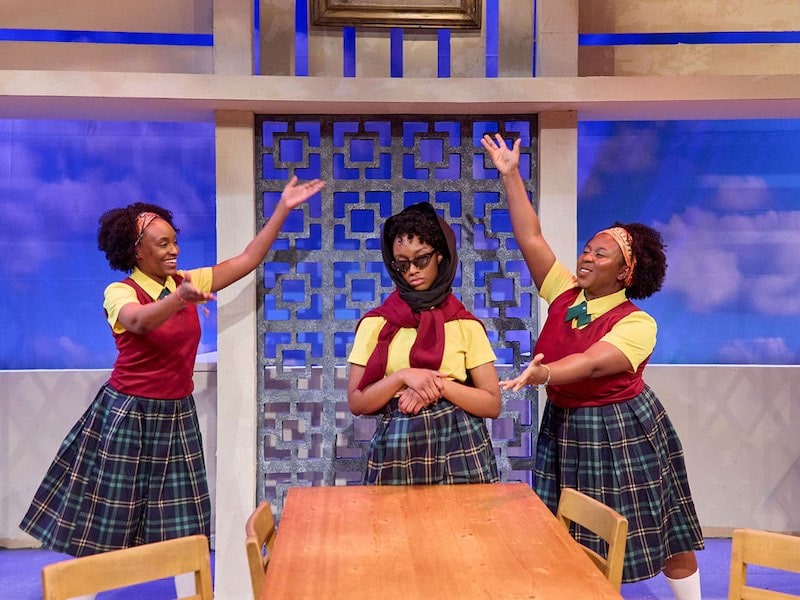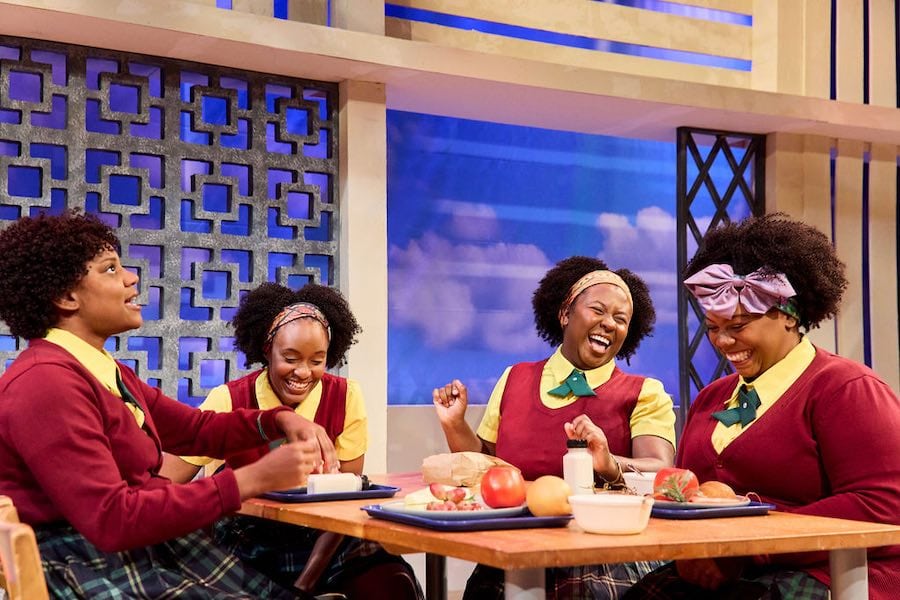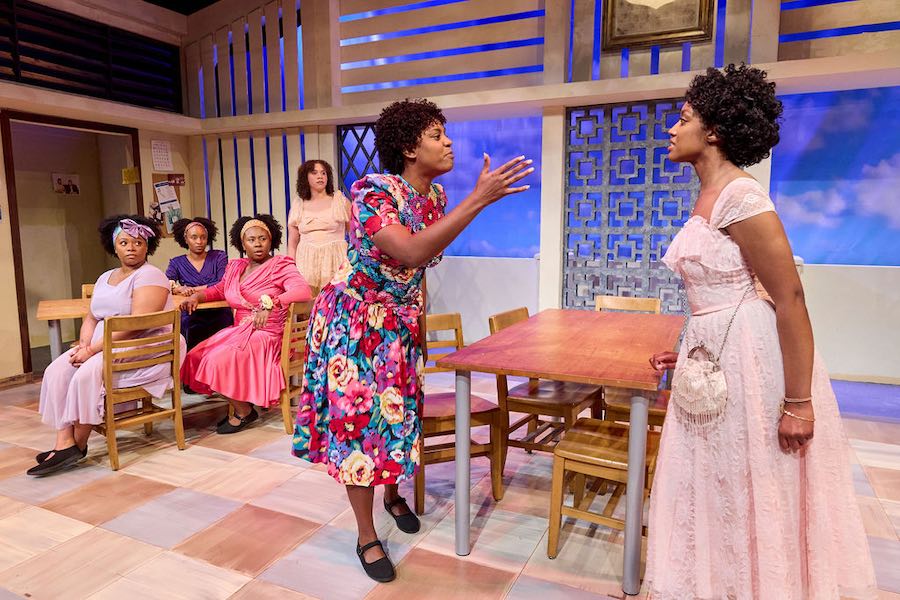By Teniola Ayoola
You are going to need skin way thicker than the Plastics from the movie Mean Girls to make it through Jocelyn Bioh’s School Girls; Or, The African Mean Girls Play now showing at NextStop Theatre. In this world of Ghanaian boarding school girls, when they go low, you go lower. For example, when an American I.J.G.B. (I-Just-Got-Back: a West African slang term for a person who has just returned home after a length of time abroad) calls you an “absolute bitch,” make sure to retort that she is a “half-caste bastard.”

This play takes us to Aburi boarding school in 1986 Ghana where Paulina is the leader of a pack of “friends” whom she bullies with insults and back-handed compliments. Only her best friend, Ama, initially stands up to her. The arrival of an American student, Ericka, presents a threat to Paulina’s power dynamic and her dreams of being Miss Ghana 1986. In asserting her dominance over this threatening new arrival, Paulina says, “Listen, Ericka, you’re new here so let me help you understand some things, ehn? I have been running this school for a long time. Nothing and no one crosses me.” But as the drama unravels we learn that Paulina is everything but self-assured.
Bioh’s script cleverly weaves in the social issues African girls grapple with while coming of age. After colorism, fat shaming is a secondary theme addressed in this play along with cliche high-school themes of boyfriend drama, secrets, rumors, popularity contests, and subtle digs at the “dirt” in the global pageantry business. Directed by Rikki Howie Lacewell, this production of School Girls is a laughter-packed, hard-hitting play that invites you to think deeply about these issues without shoving them down your throat. It offers those in the diaspora a lot to reminisce on while skillfully and simultaneously having a message for everybody.
By the looks of the cafeteria (thanks to scenic designer Jack Golden and scenic artists Suzy Alden and Sarah Usary), Aburi boarding school is fancy. When the school girls walk in, they are clean, crisp, and dapper in their plaid skirts, knee-high stockings, and green sweater vests/cardigans. With the exception of Ericka, they all have thick 4C hair in small ’fros or twist-outs, and one or two are held back by kente-design headbands. When they show up again out of uniform, their dresses are on par with ’80s laces, padded shoulders, pleats, and sashes. Costume designer Imari Pyles did an excellent job styling the adults as well. When Brenda Parker, who plays the school’s headmistress, comes on stage, her shiny braided cap glistens. We take notice of her statement necklace, and though there are more fabulous jobs out there, we can tell that she brings a touch of refinement and style to her role as principal. When Eloise, Miss Ghana 1966 (played with verve by Pauline Lamb), sashays onto the stage in a pink satin jumpsuit, pearls, and long curly hair, we immediately find her attractive and beautiful. When she shows up again in a burnt-orange leather skirt suit with matching stilettos, we can’t help but stare.

But when the ladies start to speak, oh how the letdowns come. Though the playbill mentions a dialect coach — Nana Ekua Brew-Hammon — try as they may, the cast’s African accent is forcibly contrived, though consistent in its effort. Khanna Hancock (playing Paulina) and Lamb speak through their noses in high-pitched voices, which at times gets in the way of their enunciation. For example, “friend” starts to sound like something else entirely, and one has to use context clues to piece together some sentences. The West African mannerisms — “ehnhenn?” with a raised eyebrow, quick snapping of the fingers to convey commands, and the classic West African eye roll in which the unlucky target is looked at up and down slowly several times before a final drawn-out hiss and head turn — are all present but dull, failing to have the intended effect.
Additionally, the fact that a play about colorism has only one — arguably two — dark-skinned actresses is paradoxically concerning. When Paulina rhetorically asks, “Lucky where?… Lucky that I am the darkest one in my family?” we get the message, but whether it is believable is another question entirely.
None of these things are enough to take away from the strength of the play, and each member of the cast of eight is impressive in their role: Khanner Hancock as Paulina brings the bite and the heat to this play because wherever she is, her competitive, condescending attitude follows — even when her face is bleeding and blistering from the harsh bleaching creams, she makes it clear: “I am not sorry.” But we are. Growing up unloved and in poverty with a mother with children from several different men, Hancock’s depiction of Paulina’s self-hatred, self-destructive behavior, and mean-spiritedness helps us feel sorry for all the Paulinas of this world.
Caitlin Frazier as Ericka is no Adele, but she sure outshines the off-key, exaggerated singing of the other girls during the talent portion of the Miss Ghana audition. In the calm moments after all hell breaks loose, Frazier’s performance strikes a different chord that resonates even after one leaves the theater: Just because a person is rich, light-skinned, or in other words “privileged” does not mean that they do not have their fair share of struggles. When Ericka confesses that she experienced racism for being mixed-race in midwest America, has a deceased mother, and never really knew her father, we see two ladies on the stage who are more alike and in need of a shared sisterhood rather than a frenemy.
Simone Brown as Ama is strong-willed and embodies this characterization completely; even before the storyline develops, when she says, “You girls will be just fine on your own, ehn? Thinking for yourself is not hard,” we know she’s the one with the backbone in the group. Pauline Lamb is the aging, former beauty queen looking for a new way to shine; Nicole Ruthmarie as Gifty and Edima Essien as Mercy are two peas in a pod, echoing each other’s words (“makeovaaa par-tayyyyy”) and happy dances and one teaching the other to read. And Aja Goode as NaNa is shy and insecure but in the end finds the guts to go at it with Paulina.
Lighting designer Hailey LaRoe’s use of spotlights to transport the characters and the audience to a stage much grander than that of the school cafeteria deserves honorable mention. The use of light in moments like these scattered throughout the play guides the audience on the internal musings of the characters.

Playwright Jocelyn Bioh might tell you a joke — and the play contains so many that one barely notices the 80 minutes whizz by — but she won’t tell you a lie. “Comedy is a funny way of being serious,” she says in a YouTube interview with Broadway.com. The gravity of the issues that Bioh presents is undeniable. In the final act of School Girls, we see the girls watching the Miss Global Universe Pageant on their ’80s television set. On the day that NextStop’s production opened, the 2024 Miss World Pageant took place in Mumbai, India, bringing a whole new generation of young women to their televisions and smartphones to root for the contestant from their part of the world. While I will leave no spoilers here, the results help us throw away any doubts as to whether art does indeed imitate life. School Girls gives us a lot to think about, and it does so in a manner that is palatable, universally relatable, and most certainly enjoyable.
Running Time: One hour and 20 minutes, with no intermission.
School Girls; Or, The African Mean Girls Play plays through April 7, 2024, at NextStop Theatre Company, 269 Sunset Park Drive, Herndon, Virginia. Tickets cost $47 each and are available for purchase by email at [email protected], by calling the Box Office at 703.481.5930 x2, or online.
The program for School Girls; Or, The African Mean Girls Play is online here.
 Teniola Ayoola is an arts and culture enthusiast. In her free time, you can find her at an art gallery, an art museum, or at the theater. She has an undergraduate degree in Journalism and Mass Communication from the School of Media and Public Affairs at George Washington University. She has had opportunities to work with the British Broadcasting Corporation (BBC), intern with the Shakespeare Theatre Company, and receive mentorship as a White House Correspondents Association Scholar. She recently graduated with her master’s in Management from Harvard University and is now part of the “Theater U” program for art critics with DC Theater Arts. Follow her on X @TopTeniola!
Teniola Ayoola is an arts and culture enthusiast. In her free time, you can find her at an art gallery, an art museum, or at the theater. She has an undergraduate degree in Journalism and Mass Communication from the School of Media and Public Affairs at George Washington University. She has had opportunities to work with the British Broadcasting Corporation (BBC), intern with the Shakespeare Theatre Company, and receive mentorship as a White House Correspondents Association Scholar. She recently graduated with her master’s in Management from Harvard University and is now part of the “Theater U” program for art critics with DC Theater Arts. Follow her on X @TopTeniola!
School Girls; Or, The African Mean Girls Play
By Jocelyn Bioh
CAST
Simone Brown – Ama
Edima Essien – Mercy
Caitlin Frazier – Ericka
Aja Goode – NaNa
Khanner Hancock – Paulina
Pauline Lamb – Eloise
Brenda Parker – Headmistress
Nicole Ruthmarie – Gifty
Gifty Amponsem – Swing
Shayla Beckman – Swing
Angela Whittaker – Swing
CREATIVE TEAM
Rikki Howie Lacewell – Director
Jack Golden – Scenic Designer
Hailey LaRoe – Lighting Designer
Imari Pyles – Costume Designer
Martin Bernier – Properties Designer
Brandon Cook – Sound Designer
Nana Ekua Brew-Hammon – Dialect Coach
Ryan Anthony – Stage Manager
Valeria Rodriguez – Assistant Stage Manager
Jack Wilson – Technical Director
Suzy Alden – Scenic Artist
Sarah Usary – Scenic Artist
Emma Smith – Electrician
Alex Parish – Electrician




